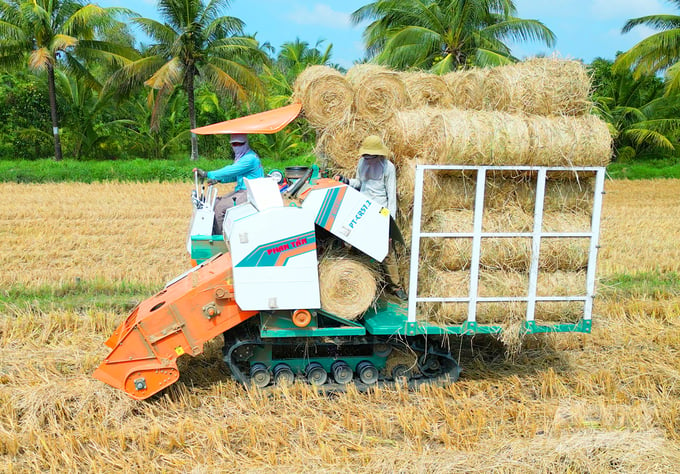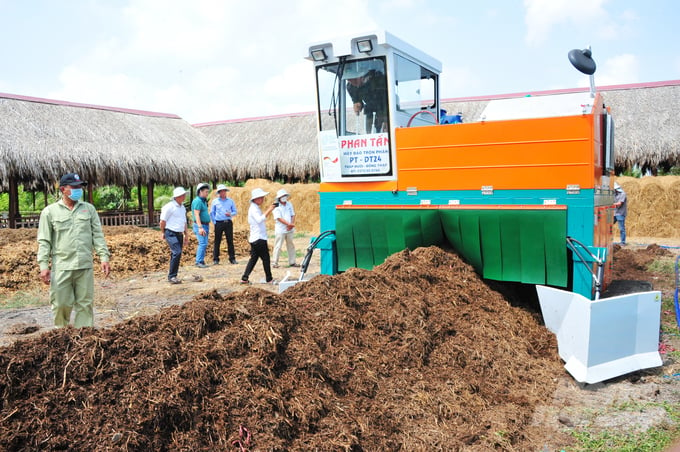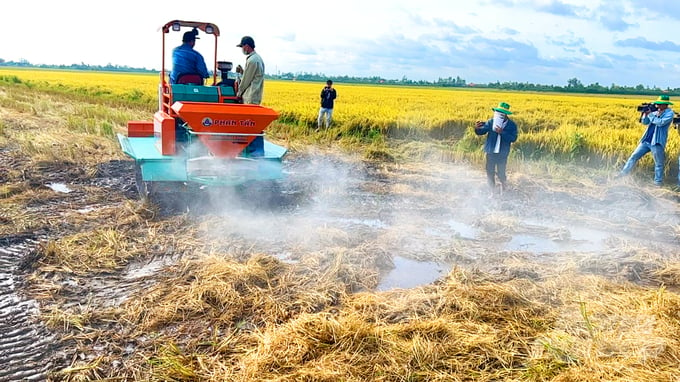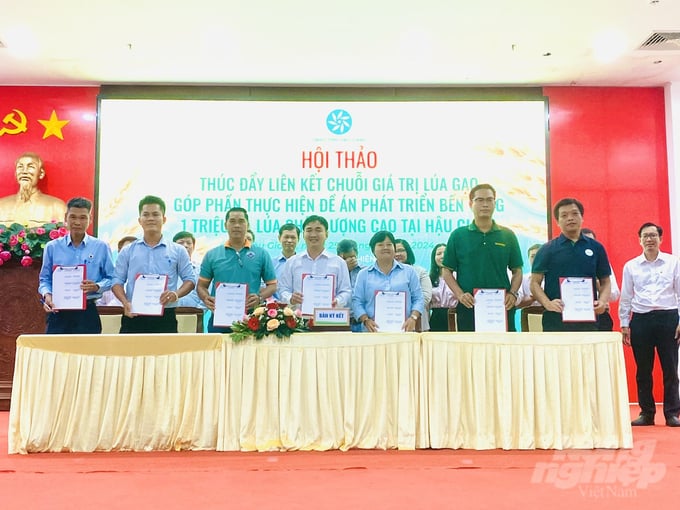May 30, 2025 | 10:29 GMT +7
May 30, 2025 | 10:29 GMT +7
Hotline: 0913.378.918
May 30, 2025 | 10:29 GMT +7
Hotline: 0913.378.918

Phan Tan’s straw baler is specifically designed to simplify and increase the efficiency of straw collection in the field. Photo: Le Hoang Vu.
With the aim of improving the quality and efficiency of agricultural production in the Mekong Delta, stakeholders are implementing the "Sustainable Development Project for one million hectares of specialized, low-emission high-quality rice in association with green growth in the Mekong Delta region by 2030" on a large scale.
Phan Tan Agricultural Machinery Co., Ltd., headquartered in Thap Muoi District, Dong Thap Province, is actively participating in this initiative. Accordingly, the company is providing modern agricultural machinery that enhances cultivation processes, reduces costs, and optimizes productivity for farmers.
Phan Tan has received recognition as a pioneering business in agricultural machinery manufacturing in the Mekong Delta region. To support the Sustainable Development Project for one million hectares of high-quality rice, Phan Tan has invested in the research and production of various modern machines to meet the increasing demands of rice production in a circular economy.
Among its notable designs, Phan Tan’s straw baler is specifically designed to simplify and increase the efficiency of straw collection in the field. The machine compacts straw into uniform bales to facilitate transportation. As a result, it allows farmers to clear fields and reuse straw for multiple purposes, such as livestock feed or organic fertilizer.
Phan Tan’s compost mixer, which processes post-harvest straw into organic fertilizer, is another valuable tool. This machine helps farmers recycle straw and remove the straw burning practice, which emits greenhouse gases and causes significant air pollution. As an alternative, the straw is mixed with beneficial additives and microorganisms to create nutrient-rich fertilizer, thereby improving soil fertility and enhancing crop growth.
With the compost mixer, farmers can produce fertilizer on-site, thereby cutting input costs and creating a stable source of organic fertilizer. Consequently, this equipment increases crop yield and promotes sustainable farming practices. Furthermore, it supports farmers in developing green agriculture models and minimizing environmental impacts.

Phan Tan’s straw compost mixer is a valuable tool that helps farmers process post-harvest straw into organic fertilizer. Photo: Le Hoang Vu.
Phan Tan’s integrated tilling and biofertilizer sprayer has achieved notable results in improving rice cultivation practices in the Mekong Delta. This multifunctional machine simultaneously tills straw into the soil and sprays microbial agents, accelerating the decomposition process and eliminating the need for burning. By reducing greenhouse gas emissions, the machine offers farmers a cost-effective and labor-saving solution for post-harvest straw processing. The microbial spray directly enriches the soil, boosting the activity of microorganisms that break down organic matter and enhancing soil nutrition and structure. This machine also fosters a well-aerated soil environment, which creates a strong foundation for future crop cycles. On the other hand, this eco-friendly solution also caters to community health and improves local air quality.
Due to its advanced features, the machine has seen widespread applications across several provinces in the Mekong Delta, resulting in practical benefits for the local farmers. Namely, it helps lower fertilizer costs, protects the environment, and improves the quality of arable land.
According to agricultural experts, the use of modern machinery in rice production has yielded practical benefits to farmers in the Mekong Delta.
The straw baler, straw compost mixer, integrated tilling and bio-sprayer and other similar tools have eliminated the necessity for farmers to spend substantial time and effort collecting and processing post-harvest straw. The machinery's precision and speed reduce the time necessary to complete these tasks, enabling farmers to advance more rapidly to the next stages of the cultivation process, thereby enhancing the yield per hectare.

Phan Tan’s integrated tilling and bio-fertilizer sprayer has significantly improved rice farming practices in the Mekong Delta. Photo: Le Hoang Vu.
The integrated tilling and bio-fertilizer sprayer rapidly processes straw without burning, thereby significantly reducing air-polluting emissions and enhancing environmental quality across the Mekong Delta.
Ngo Minh Long, Director of the Hau Giang Province's Department of Agriculture and Rural Development, announced that for the 2024-2025 winter-spring crop cycle, the province will implement approximately 1,400 hectares of low-emission rice production area within the Project's designated site, along with an additional 1,000 hectares in areas beyond the Project’s scope.
Hau Giang Province recently hosted a workshop on enhancing rice value-chain partnerships to support the sustainable development of one million hectares of high-quality rice. The workshop encouraged collaboration between local businesses, cooperatives, and the Project under the theme, “Hau Giang—Partnering with businesses and cooperatives to build a sustainable, high-quality, low-emission rice-producing region in association with green growth.” At the event, the Hau Giang Center for Agricultural Extension and Services signed a cooperation agreement with Phan Tan Agricultural Machinery Co., Ltd. to supply mechanized equipment for rice production as part of the provincial Project.
Nguyen Van Binh, a farmer from Long My District in Hau Giang, shared, “My family previously hired workers to collect and manage straw after each harvest. Thanks to Phan Tan’s straw baler, we now save on labor costs and can repurpose straw to feed our cows and create fertilizer.”

Vo Trung Lap, Deputy Executive Director of Phan Tan Agricultural Machinery Co., Ltd. (third from left), signing a cooperation agreement with the Hau Giang Center for Agricultural Extension and Services to supply mechanized equipment for rice production under the provincial Project. Photo: Le Hoang Vu.
Vo Trung Lap, Deputy Executive Director of Phan Tan Agricultural Machinery Co., Ltd., noted that with the rising demand for agricultural machinery in the Mekong Delta, the company will continue to invest in research and development of new product lines. Accordingly, Phan Tan aims to meet domestic demand and facilitate export activities, with the goal of bringing Vietnamese agricultural machinery to the global market.
Phan Tan’s involvement in the Sustainable Development Project for one million hectares of high-quality rice in the Mekong Delta has highlighted the fusion between technology and agriculture that created a breakthrough in rice production. With the support of companies such as Phan Tan, the Mekong Delta has the potential to significantly raise the quality and efficiency of rice production, contributing to the sustainable development of the agricultural sector.
Translated by Nguyen Hai Long
/2025/05/25/4127-3-073637_820.jpg)
(VAN) Thanks to the promotion from an FAO-implemented project, vegetable production in greenhouses in Moc Chau has seen strong development, from 1.5 hectares in 2021 to nearly 50 hectares in 2024.

(VAN) FAO has recently supported USD 140,000 to implement the project 'Risk mitigation human-animal interface risks through disease control initiatives in pig farming.'

(VAN) The People's Committee of Tra Vinh province has approved an adjustment to the investment policy for the Green Hydrogen Plant project, increasing its area to approximately 52.76 hectares.
![Reducing emissions from rice fields: [2] Farmers’ commitment to the soil](https://t.ex-cdn.com/nongnghiepmoitruong.vn/608w/files/news/2025/05/05/dsc08881jpg-nongnghiep-140632.jpg)
(VAN) Clean rice cultivation model in Thuong Tan commune, Bac Tan Uyen district, is assisting local residents in achieving sustainable agriculture by substantially reducing costs, increasing productivity, and protecting the environment.

(VAN) At the conference to disseminate Resolution No. 68, AgriS introduced its digital agricultural ecosystem and reaffirmed its commitment to accompanying the Government in promoting private sector development and sustainable agriculture.

(VAN) 'Blue Ocean - Blue Foods' initiative is designed to restore marine ecosystems and establish sustainable livelihoods for local communities by cultivating a minimum of 1,000 hectares of cottonii seaweed in the first three years.
/2025/05/21/4642-3-112707_603.jpg)
(VAN) The V-SCOPE project has made direct contributions to three out of six pillars of the Comprehensive Strategic Partnership between Vietnam and Australia.